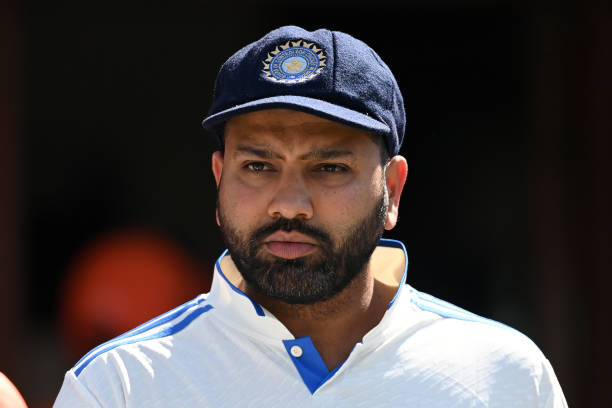Rohit Sharma, one of India’s most celebrated modern-day cricketers, has reportedly retired from Test cricket, bringing an illustrious red-ball journey to a close. While fans across the globe associate Rohit with his explosive white-ball performances, his evolution in the longer format of the game is a tale of patience, redemption, and ultimate success.
In this detailed article, we delve into Rohit Sharma’s Test cricket journey, his career statistics, top performances, records, challenges, and the reasons behind his Test retirement. This SEO-optimized post aims to offer a comprehensive look at Rohit’s impact on Test cricket and what his retirement means for Indian cricket.
🏏 Rohit Sharma’s Test Cricket Debut and Journey
📅 Test Debut
Rohit Sharma made his long-awaited Test debut on November 6, 2013, against the West Indies at Eden Gardens, Kolkata. Interestingly, it was the same series that marked Sachin Tendulkar’s farewell to Test cricket.
Test Cap No.: 280
Debut Match Performance: 177 runs in the 1st innings
His debut century made him one of the few Indians to score 100+ in their first Test innings.
⏳ A Delayed Journey
Despite making his ODI debut in 2007, Rohit had to wait for six years to break into the Test side. His journey was riddled with missed chances, including an injury just before his supposed debut in 2010.
📈 Rise in Test Cricket
🚀 2019 – The Turning Point
The biggest transformation in Rohit Sharma’s Test career came in October 2019, when he was promoted to opener in the home series against South Africa.
In that series, Rohit scored:
176 & 127 in Visakhapatnam
212 in Ranchi
He scored 529 runs in 3 matches, cementing his place as a Test opener.
Since then, he became a consistent performer for India at the top of the order.
📊 Rohit Sharma Test Career Statistics
Here’s a detailed breakdown of Rohit Sharma’s Test stats:
| Category | Stats |
|---|---|
| Matches Played | 56 |
| Innings | 98 |
| Runs Scored | 3,981 |
| Batting Average | 45.22 |
| Centuries | 10 |
| Half-Centuries | 16 |
| Highest Score | 212 |
| Catches | 47 |
🏆 Top Test Performances by Rohit Sharma
Let’s revisit some of Rohit Sharma’s finest Test performances:
1. 177 vs West Indies (2013) – Kolkata
A dream debut with elegant stroke play.
Partnered with MS Dhoni and later the tail to take India to a huge score.
2. 212 vs South Africa (2019) – Ranchi
His maiden double century.
Proved he could dominate red-ball cricket just like white-ball formats.
3. 161 vs England (2021) – Chennai
A spinning track where most batters struggled.
Rohit’s counter-attacking knock helped India level the series.
4. 127 vs England (2021) – The Oval
First overseas century in Tests.
Crucial knock in India’s memorable away win.
🧠 Rohit Sharma’s Test Batting Style
Rohit Sharma’s batting in Tests was marked by:
Time and temperament: Known for his patience as an opener.
Pull shots: Arguably one of the best in world cricket.
Shot selection: Improved significantly post-2019.
Opening partnerships: His chemistry with KL Rahul and Shubman Gill gave India many solid starts.
🇮🇳 Impact on Indian Test Cricket
1. Reliable Opener Post-Sehwag Era
India had struggled to find consistent openers post Sehwag-Gambhir. Rohit filled this crucial gap with his ability to see off the new ball and capitalize on flat decks.
2. Leadership Qualities
Rohit captained India in Test matches after Virat Kohli stepped down.
Under his leadership, India won important Test matches at home and remained competitive overseas.
3. Mentorship
Rohit mentored younger players like Shubman Gill and Yashasvi Jaiswal during his final years in Test cricket.
📉 Challenges in Rohit Sharma’s Test Career
Despite his success, Rohit Sharma’s Test journey wasn’t smooth:
1. Fitness and Injuries
He often missed crucial overseas tours due to hamstring or groin injuries.
2. Inconsistent Away Form (Early Years)
Before 2021, his away Test record was underwhelming, leading to criticisms about his place in the side.
3. Late Start
Had he debuted earlier, he could have played 80+ Tests easily, given his skill set.
🔚 Rohit Sharma Test Cricket Retirement – Why Now?
While no official retirement statement was initially released, insiders have suggested the following reasons behind his exit from red-ball cricket:
1. Age and Workload Management
At 37 years old, managing all formats, especially with World Cups and IPL commitments, becomes challenging.
2. Focus on T20 and ODIs
Rohit aims to lead India in the 2025 Champions Trophy and possibly the 2026 T20 World Cup, making it strategic to drop Tests.
3. Next Generation Stepping In
Young openers like Yashasvi Jaiswal and Shubman Gill are ready to take over, and Rohit’s exit gives them a longer run.
💬 What Rohit Sharma Said About His Test Journey
“Test cricket tests not just your skills but your character. Opening the batting has been the most fulfilling part of my Test journey. I’ve always believed in evolving as a cricketer.”
While not all of his statements have directly confirmed retirement, many hints and changes in the selection point toward a formal announcement coming soon.
📰 Reaction from Fans and Cricketing World
Rohit’s retirement from Tests has drawn emotional reactions from:
Fans: Who will miss his elegant stroke play and calm presence.
Teammates: Many younger players credit him for providing guidance and stability.
Experts: Cricket legends like Sunil Gavaskar and Ricky Ponting have praised his ability to adapt and excel in the red-ball format.
🗓️ Life After Test Retirement
What’s Next for Rohit Sharma?
ODIs and T20Is: Will continue to play white-ball cricket till 2026.
IPL: Will likely finish his career with the Mumbai Indians.
Mentorship: May take up roles to groom the next generation of batters.
Commentary or Coaching? Possible long-term plans in coaching or commentary, given his cricketing intellect.
🏁 Conclusion
Rohit Sharma’s retirement from Test cricket marks the end of a remarkable chapter in Indian cricket history. What began as a delayed journey bloomed into a glorious run, with Rohit transforming himself into a dependable Test opener and a calm leader.
Though his red-ball journey has ended, his legacy will inspire a new generation of Indian cricketers. His journey reminds us that success is not just about a perfect start—but the courage to evolve, adapt, and overcome challenges.




Leave a Comment